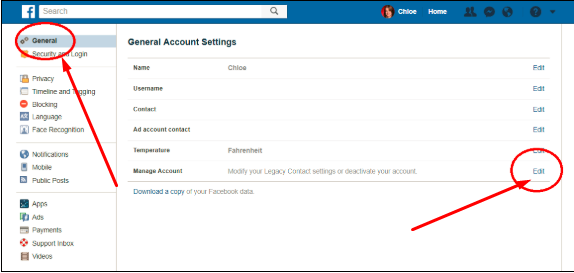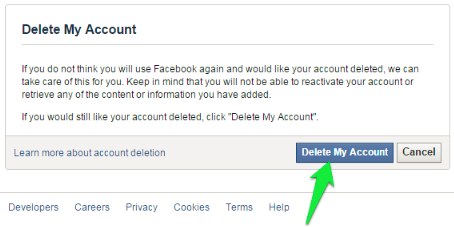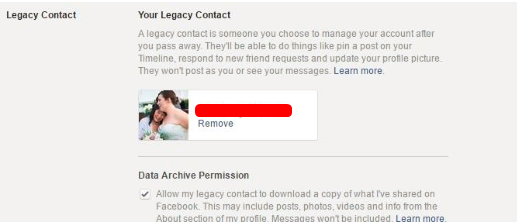Delete Of Facebook Account 2019
By
MUFY UJASH
—
Apr 7, 2019
—
Deleting Facebook Account
Current events might have you considering a break from Facebook. That's not a choice for everyone; because case, just tighten up your account settings. Delete Of Facebook Account: Yet if having your information extracted for political functions without your approval illustrations you out, there are methods to extricate on your own from the large social media.
If you await a social media break, here's the best ways to delete Facebook.
Delete Of Facebook Account
Deactivating
Facebook provides you 2 alternatives: two choices: deactivate or delete
The very first couldn't be much easier. On the desktop computer, click the drop-down menu at the top-right of your screen and select settings. Click General on the top left, Edit beside "Manage Account" Scroll down and you'll see a "Deactivate My Account" web link near the bottom. (Here's the direct link to use while visited.).
If you're on your mobile phone, such as using Facebook for iOS, similarly go to settings > Account settings > General > Manage Account > Deactivate.
Facebook does not take this lightly - it'll do whatever it could to keep you around, consisting of psychological blackmail about how much your friends will miss you.
Therefore, "Deactivation" is not the like leaving Facebook. Yes, your timeline will certainly go away, you won't have access to the website or your account by means of mobile apps, friends can't post or contact you, and also you'll lose access to all those third-party services that use (or need) Facebook for login. But Facebook does not erase the account. Why? So you could reactivate it later on.
Just in case that expected re-activation isn't in your future, you must download a copy of all your data on Facebook - posts, images, videos, talks, and so on-- from the settings menu (under "General"). Just what you discover might stun you, as our Neil Rubenking learnt.
Account Deletion
To completely erase your Facebook account forever and ever, most likely to the Erase My Account page at https://www.facebook.com/help/delete_account. Simply realize that, per the Facebook data use policy "after you remove info from your profile or delete your account, copies of that info may continue to be viewable somewhere else to the level it has actually been shown to others, it was or else distributed according to your personal privacy settings, or it was copied or saved by various other individuals.".
Translation: if you wrote a comment on a buddy's condition upgrade or photo, it will continue to be even after you erase your own profile. Several of your posts and pictures might hang around for as long as 90 days after removal, also, though simply on Facebook servers, not survive on the website.
Deletion on Behalf of Others
If you wish to inform Facebook concerning a customer you understand is under 13, you can report the account, you narc. If Facebook can "sensibly verify" the account is used by somebody underage-- Facebook bans kids under 13 to adhere to federal regulation-- it will certainly erase the account quickly, without educating any person.
There's a different form to request removal of represent individuals who are clinically incapacitated and also thus not able to use Facebook. For this to function, the requester must prove they are the guardian of the person in question (such as by power of attorney) in addition to deal an official note from a physician or medical center that spells out the incapacitation. Redact any type of info required to maintain some privacy, such as clinical account numbers, addresses, etc.
If an individual has actually died, a legacy get in touch with-- a Facebook buddy or family member who was marked by the account owner prior to they passed away-- could obtain access to that individual's timeline, as soon as approved by Facebook. The heritage contact could have to give a connect to an obituary or other documentation such as a fatality certificate. Facebook will certainly "hallow" the web page so the deceased timeline resides on (under control of the legacy call, who can't publish as you), or if liked, remove it.
Designate a specific legacy contact person to handle your account after your passing. You can locate that under settings > General > Manage Account > Your Legacy Contact. As soon as you established one up, you'll obtain a notice every year from Facebook to double check that the contact need to remain the same, unless you opt out of that. You can likewise take the additional step of making certain that after you pass away, if the heritage call does report you to Facebook as dead, your account gets deleted (even if the heritage contact wants the timeline to be hallowed).
If you await a social media break, here's the best ways to delete Facebook.
Delete Of Facebook Account
Deactivating
Facebook provides you 2 alternatives: two choices: deactivate or delete
The very first couldn't be much easier. On the desktop computer, click the drop-down menu at the top-right of your screen and select settings. Click General on the top left, Edit beside "Manage Account" Scroll down and you'll see a "Deactivate My Account" web link near the bottom. (Here's the direct link to use while visited.).
If you're on your mobile phone, such as using Facebook for iOS, similarly go to settings > Account settings > General > Manage Account > Deactivate.
Facebook does not take this lightly - it'll do whatever it could to keep you around, consisting of psychological blackmail about how much your friends will miss you.
Therefore, "Deactivation" is not the like leaving Facebook. Yes, your timeline will certainly go away, you won't have access to the website or your account by means of mobile apps, friends can't post or contact you, and also you'll lose access to all those third-party services that use (or need) Facebook for login. But Facebook does not erase the account. Why? So you could reactivate it later on.
Just in case that expected re-activation isn't in your future, you must download a copy of all your data on Facebook - posts, images, videos, talks, and so on-- from the settings menu (under "General"). Just what you discover might stun you, as our Neil Rubenking learnt.
Account Deletion
To completely erase your Facebook account forever and ever, most likely to the Erase My Account page at https://www.facebook.com/help/delete_account. Simply realize that, per the Facebook data use policy "after you remove info from your profile or delete your account, copies of that info may continue to be viewable somewhere else to the level it has actually been shown to others, it was or else distributed according to your personal privacy settings, or it was copied or saved by various other individuals.".
Translation: if you wrote a comment on a buddy's condition upgrade or photo, it will continue to be even after you erase your own profile. Several of your posts and pictures might hang around for as long as 90 days after removal, also, though simply on Facebook servers, not survive on the website.
Deletion on Behalf of Others
If you wish to inform Facebook concerning a customer you understand is under 13, you can report the account, you narc. If Facebook can "sensibly verify" the account is used by somebody underage-- Facebook bans kids under 13 to adhere to federal regulation-- it will certainly erase the account quickly, without educating any person.
There's a different form to request removal of represent individuals who are clinically incapacitated and also thus not able to use Facebook. For this to function, the requester must prove they are the guardian of the person in question (such as by power of attorney) in addition to deal an official note from a physician or medical center that spells out the incapacitation. Redact any type of info required to maintain some privacy, such as clinical account numbers, addresses, etc.
If an individual has actually died, a legacy get in touch with-- a Facebook buddy or family member who was marked by the account owner prior to they passed away-- could obtain access to that individual's timeline, as soon as approved by Facebook. The heritage contact could have to give a connect to an obituary or other documentation such as a fatality certificate. Facebook will certainly "hallow" the web page so the deceased timeline resides on (under control of the legacy call, who can't publish as you), or if liked, remove it.
Designate a specific legacy contact person to handle your account after your passing. You can locate that under settings > General > Manage Account > Your Legacy Contact. As soon as you established one up, you'll obtain a notice every year from Facebook to double check that the contact need to remain the same, unless you opt out of that. You can likewise take the additional step of making certain that after you pass away, if the heritage call does report you to Facebook as dead, your account gets deleted (even if the heritage contact wants the timeline to be hallowed).







